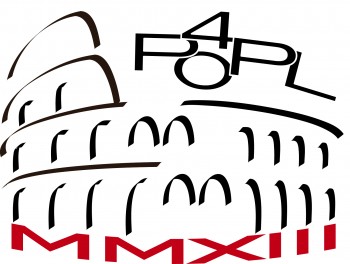 |
POPL 2013: 40th ACM SIGPLAN-SIGACT Symposium on Principles of Programming LanguagesRome, Italy
|
Accepted papers
- A Model-Learner Pattern for Bayesian Reasoning.
Andrew D. Gordon (Microsoft Research and University of Edinburgh), Mihhail Aizatulin (Open University), Johannes Borgstroem (Uppsala University), and Guillaume Claret, Thore Graepel, Aditya Nori, Sriram Rajamani, and Claudio Russo (Microsoft Research) - A Theorem Prover for Boolean BI.
Jonghyun Park, Jeongbong Seo, and Sungwoo Park (POSTECH) - Abstract Conflict Driven Learning.
Vijay D'Silva (University of California, Berkeley) and Leopold Haller and Daniel Kroening (University of Oxford) - Abstraction and Invariance for Algebraically Indexed Types.
Robert Atkey and Patricia Johann (University of Strathclyde) and Andrew Kennedy (Microsoft Research) - Advanced Automata Minimization.
Richard Mayr (University of Edinburgh) and Lorenzo Clemente (LaBRI, University of Bordeaux I) - Automatic Detection of Floating-Point Exceptions.
Earl T. Barr, Thanh Vo, Vu Le, and Zhendong Su (UC Davis) - Automating Relatively Complete Verification of Higher-order Functional Programs.
Hiroshi Unno (The University of Tokyo), Tachio Terauchi (Nagoya University), and Naoki Kobayashi (The University of Tokyo) - Cache and I/O Efficient Functional Algorithms.
Guy E. Blelloch and Robert Harper (Carnegie Mellon University) - Checking NFA equivalence with bisimulations up to congruence.
Filippo Bonchi and Damien Pous (CNRS, ENS Lyon, Université de Lyon) - Complete Instantiation-Based Interpolation.
Nishant Totla (Indian Inistitute of Technology Bombay) and Thomas Wies (New York University) - Copatterns: Programming Infinite Structures by Observations.
Andreas Abel (LMU Munich), Brigitte Pientka and David Thibodeau (McGill University), and Anton Setzer (Swansea University) - Deadlock-freedom-by-design: Multiparty Asynchronous Global Programming.
Marco Carbone and Fabrizio Montesi (IT University of Copenhagen) - Fault Tolerance via Idempotence.
G. Ramalingam and Kapil Vaswani (Microsoft Research) - Full Abstraction for Nominal Scott Domains.
Steffen Lösch and Andrew Pitts (University of Cambridge) - Fully Abstract Compilation to JavaScript.
Cedric Fournet, Nikhil Swamy, Juan Chen, and Pierre-Evariste Dagand (Microsoft Research), Pierre-Yves Strub (MSR-INRIA), and Ben Livshits (Microsoft Research) - HALO: From Haskell to First-Order Logic through Denotational Semantics.
Dimitrios Vytiniotis and Simon Peyton Jones (Microsoft Research) and Koen Claessen and Dan Rosén (Chalmers) - High-level Separation Logic for Low-Level Code.
Jonas B. Jensen (ITU Copenhagen) and Nick Benton and Andrew Kennedy (Microsoft Research) - Hyperstream Processing Systems: Nonstandard Modeling of Continuous-Time Signals.
Kohei Suenaga (Kyoto University) and Hiroyoshi Sekine and Ichiro Hasuo (University of Tokyo) - Inductive Data Flow Graphs.
Azadeh Farzan and Zachary Kincaid (University of Toronto) and Andreas Podelski (University of Freiburg) - Library Abstraction for C/C++ Concurrency.
Mark Batty and Mike Dodds (University of Cambridge) and Alexey Gotsman (IMDEA Software Institute) - Linear Dependent Types for Differential Privacy.
Marco Gaboardi (Università di Bologna - University of Pennsylvania) and Andreas Haeberlen, Justin Hsu, Arjun Ravi Narayan, and Benjamin C. Pierce (University of Pennsylvania) - Logical Relations for Fine-Grained Concurrency.
Aaron Turon (Northeastern University), Jacob Thamsborg (IT University of Copenhagen), Amal Ahmed (Northeastern University), Lars Birkedal (IT University of Copenhagen), and Derek Dreyer (MPI-SWS, Germany) - Meta-Theory a la Carte.
Benjamin Delaware (University of Texas at Austin), Bruno C. d. S. Oliveira (National University of Singapore), and Tom Schrijvers (Ghent University) - On the Linear Ranking Problem for Integer Linear-Constraint Loops.
Amir M. Ben-Amram (The Tel-Aviv Academic College) and Samir Genaim (Complutense University of Madrid) - Optimizing Data Structures in High-Level Programs: New Directions for
Extensible Compilers based on Staging.
Tiark Rompf (EPFL), Arvind Sujeeth (Stanford), Nada Amin (EPFL), Kevin Brown (Stanford), Vojin Jovanovic (EPFL), HyoukJoong Lee (Stanford), Manohar Jonalagedda (EPFL), Kunle Olukotun (Stanford), and Martin Odersky (EPFL) - Plan B: A Buffered Memory Model for Java.
Delphine Demange (ENS Cachan / IRISA), Vincent Laporte (Purdue University / ENS Cachan), Lei Zhao and Suresh Jagannathan (Purdue University), David Pichardie (Purdue University / INRIA), and Jan Vitek (Purdue University) - Principled Parsing for Indentation-Sensitive Languages.
Michael D. Adams (Portland State University) - Quantitative Abstraction Refinement.
Pavol Cerny, Thomas A. Henzinger, and Arjun Radhakrishna (IST Austria) - Quantitative Relaxation of Concurrent Data Structures.
Thomas A. Henzinger (IST Austria), Christoph M. Kirsch and Hannes Payer (University of Salzburg), Ali Sezgin (IST Austria), and Ana Sokolova (University of Salzburg) - Sigma*: Symbolic Learning of Stream Filters.
Matko Botincan (University of Cambridge) and Domagoj Babic (UC Berkeley) - Static and Dynamic Semantics of NoSQL Languages.
Véronique Benzake (LRI - Université Paris-Sud), Giuseppe Castagna (CNRS - Université Paris Diderot), Kim Nguen (LRI - Université Paris-Sud), and Jérôme Siméon (IBM Watson Research) - Sub-Polyhedral Scheduling Using (Unit-)Two-Variable-Per-Inequality Polyhedra.
Ramakrishna Upadrasta (INRIA and LRI, Paris-Sud 11 University) and Albert Cohen (INRIA and DI, Ecole Normale Superieure) - Subjective Auxiliary State for Coarse-Grained Concurrency.
Ruy Ley-Wild and Aleksandar Nanevski (IMDEA Software Institute) - Synthesis of Biological Models from Mutation Experiments.
Ali Sinan Köksal, Yewen Pu, Saurabh Srivastava, and Rastislav Bodík (University of California, Berkeley), Jasmin Fisher (Microsoft Research), and Nir Piterman (University of Leicester) - The Geometry of Types.
Ugo Dal Lago and Barbara Petit (Università di Bologna and INRIA) - The lambda lambda-bar calculus.
Alexis Goyet (PPS, Université Denis Diderot, Paris) - The Power of Parameterization in Coinductive Proof.
Chung-Kil Hur (Microsoft Research), Georg Neis (MPI-SWS and Saarland University), and Derek Dreyer and Viktor Vafeiadis (MPI-SWS) - The Sequential Semantics of Producer Effect Systems.
Ross Tate (Cornell University) - The Ramifications of Sharing in Data Structures.
Aquinas Hobor (National University of Singapore) and Jules Villard (University College London) - The Type Discipline of Behavioral Separation.
Luis Caires and Joao Seco (Universidade Nova de Lisboa) - Towards Fully Automatic Placement of Security Sanitizers and Declassifiers.
Benjamin Livshits (Microsoft Research) and Stephen Chong (Harvard University) - Universal properties of impure programming languages.
Sam Staton (University of Cambridge) and Paul Levy (University of Birmingham) - Views: Compositional Reasoning for Concurrent Programs.
Thomas Dinsdale-Young (Imperial College), Lars Birkedal (IT University of Copenhagen), Philippa Gardner (Imperial College), Matthew Parkinson (Microsoft Research), and Hongseok Yang (University of Oxford)